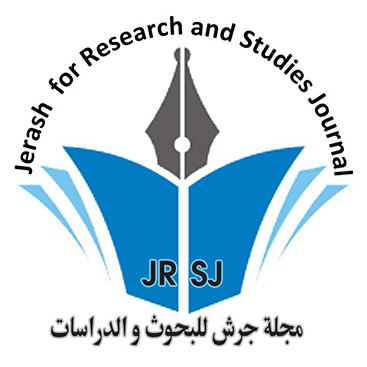Jerash for Research and Studies Journal مجلة جرش للبحوث والدراسات

Abstract
Drought is one of the most limiting factors for agricultural productivity worldwide (Hamdi et al., 2020). Drought stress can be simply defined as a shortage of water that causes significant changes in plant morphology, physiology, and biochemistry (Liang et al., 2020), and the most environmental stress that affect both crop production and quality (Biareh et al., 2022). Approximately, 95-98% of the water absorbed by the plant is lost via transpiration (Singh et al., 2021), so that reducing the transpiration rate could be considered as an important strategy for combating with drought conditions. This could be achieved by using compounds called anti-transpirants (ATs) which are chemicals that reduces the loss of water from plant leaves by decreasing both the size and number of stomata (Sow and Ranjan, 2021). The research was carried out at the 2ed faculty of agriculture and at the laboratory of plant physiology during years 2021 and 2022. Chili pepper was used as plant material under two levels of deficit irrigation (50 and 70 of field capacity) in addition to control (100% of field capacity). Under each irrigation level, three types of ATs compounds were applied ten days after drought stress treatments. Plants were sprayed with salicylic acid at two different concentrations 1 and 0.5 mMol (as a stomata closing AT type), flaxseed oil emulsion at 20% concentration (that combines two types of ATs: a film forming and a reflective AT type) and glycerol at 6% concentration (as a film forming AT type). 120 days after planting, following parameters were determined: plant height, root length, number of roots per plant, leaf area (dm2), plant dry weight (g), fruit diameter and weight (g) and total soluble solids (TSS %). Relative water content RWC (%), leaf content of total chlorophyll (mg/ g fresh weight) and water use efficiency WUE (g/l) were determined as well. The experiment was performed as completely randomized design (CRD) in a factorial system. The results showed a reduction in all growth parameters by increasing drought stress level as compared to the control (100% of field capacity). Foliar application of ATs showed a significant effect in improving growth parameters under drought stress conditions. Application of flaxseed oil increased plant growth and fruit quality with significant difference as compared to drought stress treatment. While SA exceeded significantly drought stress treatments concerning root length, number of leaves per plant, leaf area and TTS. Additionally, SA and flaxseed oil application increased RWC and WUE with significant deference compared to drought stress treatments. A reduction in chlorophyll content and plant dry weight was recorded in all ATs application, but no significant differences were recorded in comparison to irrigation levels applied.
Recommended Citation
Alnaddaf, Ola; Abo Saeb, Elien; and Abo Assi, Ayman
(2023)
"Anti- transpirants Impact on Pepper cultivated Under Different Drought Stress Levels,"
Jerash for Research and Studies Journal مجلة جرش للبحوث والدراسات: Vol. 24:
Iss.
2, Article 12.
Available at:
https://digitalcommons.aaru.edu.jo/jpu/vol24/iss2/12
Included in
Agriculture Commons, Arts and Humanities Commons, Social and Behavioral Sciences Commons

